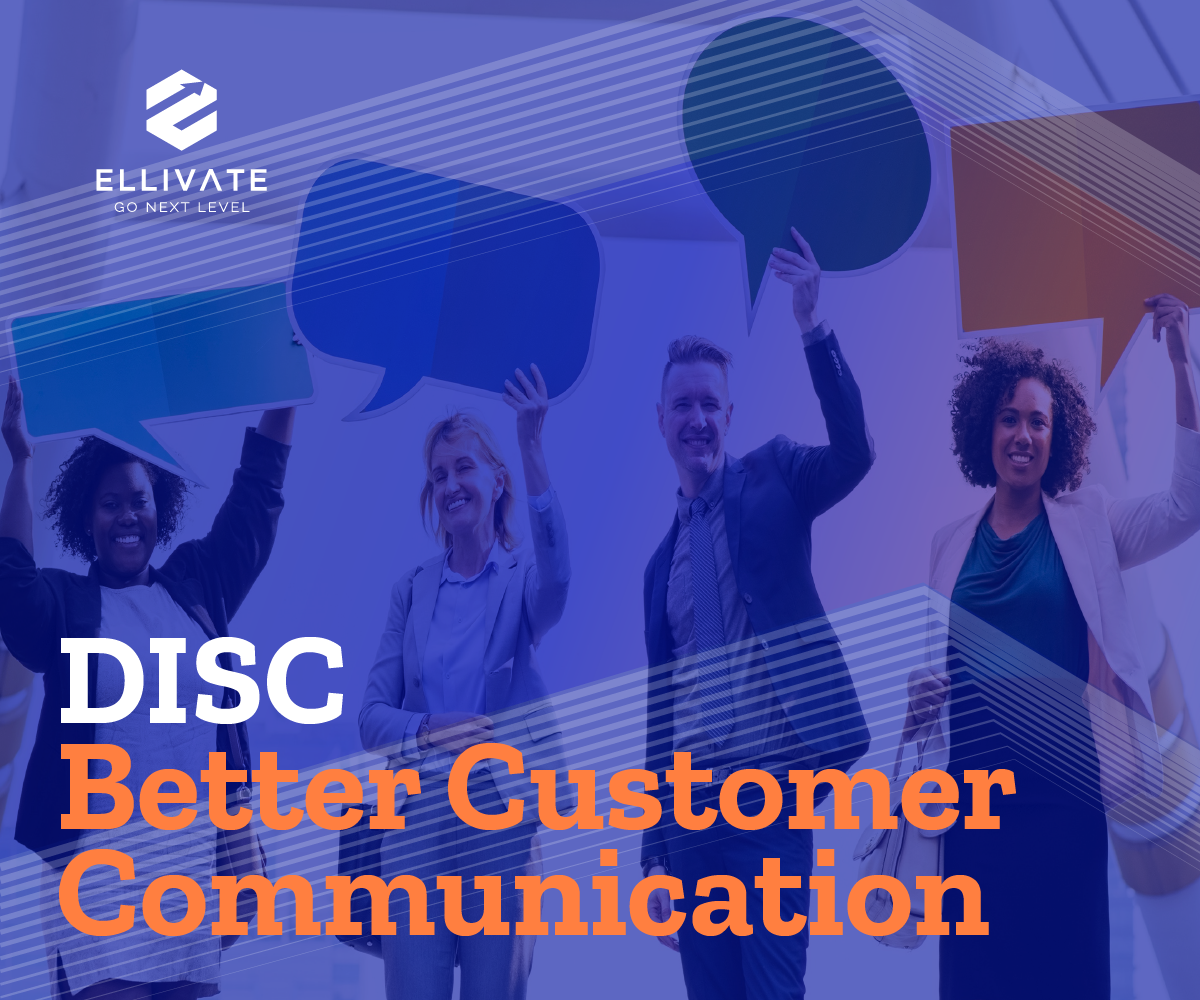Building rapport with a prospect or customer is an essential part of any early sales or service interaction. It is key to being able to develop and nurture an ongoing relationship.
Everyone displays different behavioural traits and personality types that they’ve built up over the years through their values, beliefs, and experiences. For go-to-market team members, the challenge is to engage with prospects and customers in different ways to build rapport, trust, and credibility.
By adapting our communication style with different customers, go-to-market team members can:
- Generate more sales
- Improve the perception of us as an individual, our product or service and the brand of the organisation
- Get repeat business and minimise churn
- Generate referrals, new contacts, and further business

DISC is a behavioural profiling tool that you can use to help individuals better understand their personality and behavioural traits and their impact on others. It’s a powerful tool to understand yourself and how you communicate within your teams, with others across your organisation, and your customers.
The four different behavioural profiles are:
- Dominance
- Influence
- Steadiness
- Compliance
No one type is better than another. We all tend to use each of the types in different situations; however, we will display a preferred style.
Let’s look at each in turn and what it means for you in your sales or service role:
Dominance:
Individuals who display these traits tend to be fast-paced, but they’re more focused on the task than the person. Senior leaders in organisations often display these traits and can be more demanding than other personality types.
They’re impatient, interrupt others and may become more irritated quickly. They like to focus on the bigger picture view of the world.
When you’re in a sales or service conversation with that person, some of the things that you should do are:
- Be more professional and efficient with them
- Be very direct because you’re likely to establish rapport more quickly
- You’re likely to need to provide options to them so that the customer feels that they’re in control of this situation
- You want to focus on results, outcomes, and the fact that the customer feels that they’re winning from the situation
- You need to give them immediate feedback, concentrate on the subject or the product at hand that you’re talking about
- Act quickly because this is someone who wants to get to the end result as fast as possible
Some activities to avoid are:
- Waste their time with small talk
- Go into all the details about the product and provide too much information
- Try to control the situation because this customer wants to feel that they’re in control

Influence:
These individuals are people-focused and fast-paced. To identify an ‘I’ style, you will likely see someone who gets animated quite quickly and gets very excitable in the conversation.
They’re going to be very open and friendly; they’re going to stay away from some of the hard facts, and they may make decisions quite spontaneously.
When you’re in a sales or service conversation with that person, some of the things that you should do are:
- Focus on the relationship, take the time to chat with them and find out more about them
- Be more expressive and summarise the main points that you’re discussing with them
- Be enthusiastic with them and give them recognition and approval throughout the conversation as this will build rapport
- Appeal to their emotions by asking how they feel about the products and service because it’s going to give them a chance to express themselves
Some activities to avoid are:
- Don’t talk too many details because they are much more focused on the people side of things, and you don’t want to bring up negative issues with them
- Don’t be too practical in the situation because that may well impact how you can build rapport with them
Steadiness:
These individuals are still very people-focused, but they tend to move at a slower pace and want to understand a little more about the situation before making decisions. It’s likely going to be quite an easy-going conversation where they’re going to listen carefully, ask questions about the specifics of the product or service.
When you’re in a sales or service conversation with that person, some of the things that you should do are:
- Proceed in a logical order and ask specific questions to find out their actual needs whilst providing support throughout the process – it will give them confidence that you’re there as a supporter and an ally
- Provide a precedence to reduce uncertainty for the individual
- Collaborate with them and openly discuss the issues they might be thinking about – conversationally do this, so it keeps building rapport and trust with them
- Demonstrate some of the lower risk solutions because it’s likely that they are going to be more risk-averse than some of the other traits discussed
Some activities to avoid are:
- Don’t forget your promises – if you say you’re going to follow up, you need to follow up because they will remember!
- Don’t make any unexpected changes for them – they like certainty, so you turn up at the time you said you would arrive for a meeting

Compliance:
An individual who displays compliance traits is very focused on the task and loves information and data. They tend to operate at a slower pace and think things through.
Individuals will be a lot quieter in the conversation, want to focus on the details, ask lots and lots of questions, and they’re likely to have done their homework before they even meet you.
When you’re in a sales or service conversation with that person, some of the things that you should do are:
- Listen carefully, answer their questions calmly and be very thorough when you’re talking about different products and services because they want to know all the relevant information
- Slow down your presentation – a lot of us in sales and service roles fall under the ‘Influence’ trait, so we tend to go through these things very quickly
- Be very systematic, exact, and logical in the way that present and engage
Some activities to avoid are:
- Moving too fast, so they don’t have the time to take information on board and think
- Spending too much time on the small talk with them
- Expecting them to decide right away. They will likely want to mull over and think about the details or even do some extra research on
- Challenging their product knowledge or point of view in these situations because it’s something that they hold very close and dear to their hearts

Building rapport and trust with individuals in any situation is critical, whether a work colleague, boss, or potential customer. You can use the above strategies in all these situations once you understand the preferred traits of the individual you are engaging with.
A great way to help in sales and service situations is to develop customer personas and apply DISC to each persona. For example, you may find that you would use Dominance strategies if engaging a CEO who has this as their preferred trait. You can then develop tactics to support your engagement as part of your outreach.
You can adapt all your communication; think about all the different channels you are likely to use across the sales cycle.
Imagine tailoring your activity based on understanding the persona and their DISC preference. The channels you would want to consider are:
- LinkedIn outreach
- Emails
- Phone calls
- Texts
- Face to face meetings
It’s no different when you come to close the sale – there are many different closing techniques that you may be using but are you using the correct method for the DISC preference of the potential customer?
Let’s take the high Dominance CEO:
A direct close can work well with them – “We seem to agree on everything – Let’s get this finalised.”
However, this will cause undue stress for a high Steadiness and could damage all your hard work to build rapport with the potential customer.
A better closing technique would be the summary close…
“So, Mr Customer. Over the last few weeks, your team has rolled out a great pilot of our tool.”
“With the product, you were able to . We have already greenlit the feature request and reduced the price to $2000 per month.
All that is left is for you to sign on the dotted line and start improving .”
Being adaptable and planning for these conversations is crucial. By being better prepared and more intentional, you will build better rapport, credibility, and trust with the customer. Significantly you won’t damage the hard work you have put in throughout the sales process.
In a sales or service situation, DISC will help you gain a new customer, retain an existing customer, or grow your relationship further. Take the time to understand who is in front of you and adapt your style accordingly – you are sure to see improved results!
Want to know more about DISC?
You can download our free factsheet here – highlighting some of the critical behavioural attributes that customers demonstrate to help you identify their preferred style.
Chris Ellis is accredited in DISC ADVANCED®, which is the worlds most advanced DISC assessment. Unlike other “personality tests”, these assessments were designed for the workplace from the ground up.
The assessment measures both the subconscious “real self” and the conscious behavioural styles. This permits evaluation of the impact of the work environment and potential job pressures on the person.
You can find out more about this program here.
Various reports are available depending on your need, including DISC Profile, DISC for Leadership and DISC for Sales.
About Ellivate
Ellivate is the expert partner helping organisations and their go-to-market team’s scale.
Our powerhouse team of industry experts – with a combined 60 years of experience across the fintech, corporate and technology spaces – will work alongside your business to achieve your goals.
We have a shared passion for working with businesses to achieve rapid growth and apply an authentic, human layer of expertise that addresses the real challenges and concerns at the heart of your business.
We will work alongside you as a trusted and expert partner. We get in the trenches and ensure every solution is embedded within your business.




